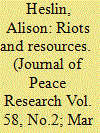|
|
|
Sort Order |
|
|
|
Items / Page
|
|
|
|
|
|
|
| Srl | Item |
| 1 |
ID:
172051


|
|
|
|
|
| Summary/Abstract |
This article presents new, original data on food riots and protests between 2005 and 2015 and explores the societal conditions in which these events occurred. These conditions include a range of economic, social, demographic, political, and household consumption factors, with reference to a number of conflict theories. The article explores whether instability related to food prices should be seen as an expression of hunger within the most vulnerable and deprived societies, or a demonstration of grievances rooted in broader political contestation. The article also contributes to debates about the methodological challenges of focusing on food prices as a factor relevant to instability and conflict, and the question of whether food riots have significance to broader debates about conflict.
|
|
|
|
|
|
|
|
|
|
|
|
|
|
|
|
| 2 |
ID:
178680


|
|
|
|
|
| Summary/Abstract |
How does food access affect the mobilization of collective violence? The upsurge in rioting in 2008 drew broad attention to the relationship of food and conflict, as scholars and policymakers sought to understand the mobilization and variation of rioting events. Studies have shown a robust relationship between conflict and food prices, noting an increase in incidents of violent conflict during times of high global prices. This study furthers the theory on the role of food access in riot mobilization, investigating the mechanisms by which changes in food access translate into collective violence. Using detailed, first-hand accounts of rioting in 2007 and 2008, this study investigates the motives and grievances of the community members where riots occurred and the relationship of those grievances to food access, while contrasting these accounts to communities that did not engage in rioting. In the cases presented, a change in food access motivated protest and violence involving existing grievances rather than explicitly addressing food access. In this way, food changed the meaning and severity of existing grievances. The cases studied add to our understanding of concurrent upsurges in food riots by outlining the ways that food access interacts with local contexts to initiate violent conflict, stressing the presence of existing actors who use decreased food access to mobilize resources to address existing grievances. While media accounts highlighted food access as the primary concern of food rioters, this study argues that many ‘food riots’ were not, in fact, directly motivated by food access. Rather, changes to food access can aid in mobilizing protests around a range of grievances, some unrelated to food access. Efforts to address the causes of food-related instability will be unsuccessful if they focus solely on food access without addressing the primary motivating grievance and understanding how food access relates to that grievance.
|
|
|
|
|
|
|
|
|
|
|
|
|
|
|
|
| 3 |
ID:
173887


|
|
|
|
|
| Summary/Abstract |
A large body of research indicates that environmental conditions can influence the risk of social unrest. However, we know little about how these effects may change in the long run. Are they likely to remain constant or do they change over time – for example as a consequence of human adaptation? To investigate this question, we rely on a disaggregated analysis of England over a period of more than 300 years. Combining data on geo-referenced food riots with reconstructed climate data, we first assess the impact of annual temperatures on social unrest over the period 1500–1817. We then use our long-term time-series dataset to assess the temporal heterogeneity of year-to-year associations between temperatures and social conflict. Our models show a substantive negative correlation between temperatures and food riots in the aggregate. This association, however, seems to be highly inconsistent over time and largely confined to the 18th century. In addition, we find evidence of decadal processes of adaptation: past exposure to adverse weather conditions dampens the effect of current exposure. Taken together, these findings underline the importance of considering temporal heterogeneities when assessing the climate–conflict nexus and caution against any simple extrapolations of observable present-day effects of environmental conditions into the future.
|
|
|
|
|
|
|
|
|
|
|
|
|
|
|
|
| 4 |
ID:
089681


|
|
|
|
|
| Publication |
2009.
|
| Summary/Abstract |
Increased food prices have had a devastating effects on the welfare of the one billion people worldwide who lives on less than world's least-developed countries typically spend more than half their income on food. World hunger has taken on a new face. No longer is it confined to images of emaciated children and dead cattle transmitted for decades from dusty, arid, African plains.
|
|
|
|
|
|
|
|
|
|
|
|
|
|
|
|
|
|
|
|
|